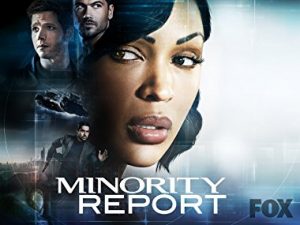Watching the pilot episode of “Minority Report” (9 p.m. Eastern Mondays on Fox) really makes me want to do a rewatch of “Almost Human,” “Century City” and “Dollhouse.” Set in 2065, this series that continues from the 2002 Steven Spielberg film – which was itself adapted from a Philip K. Dick short story – looks gorgeous, like those other future-set shows.
With perfectly timed bullet trains, teleprompter glasses and video-recorder eye implants, the production designers do a wonderful job imagining the technology. Plus, in a nod to things being less than perfect, there’s also an unfinished mall with a sign saying it was set to open in 2036.
Nice bits of humor
Also putting a smile on my face, the screenwriters demonstrate a nice sense of humor with an advertisement for the 75th season of “The Simpsons” and a mother telling her daughter “Back in my day, people met on Tinder.” And perhaps in a nod to the recent blurring of the line between police and military, police officers walk the streets in camo. It very much feels like 2065, and indeed a 2065 that PKD would be proud of.

“Minority Report” (2015)
Mondays, Fox
Developed by: Max Borenstein
Starring: Stark Sands, Meagan Good, Nick Zano
But I’d rather watch those other shows because they served up a smorgasbord of imaginative storytelling possibilities: “Almost Human” had future cop cases, “Century City” had future law cases, and the main characters of “Dollhouse” could be programmed as different people. Yes, there were misfires now and then, but you could come back the next week and hope for better.
Through one episode, I don’t see any reason to care about the characters or plot of “Minority Report.” Don’t get me wrong: There are characters worth feeling sorry for. Dash (Stark Sands), like all precogs, had the early part of his life wiped out by being locked in a government facility while his brain’s information on future crimes was recorded.
And since the abolishment of the precog program (whether on the grounds of cruelty to precogs or Eighth Amendment violations of the “pre-criminals’ ” rights is unclear; maybe it was a combination of both), Dash is still haunted by random visions of murders much like “Millennium’s” Frank Black.
And – although the show probably doesn’t intend for me to feel this way – the antagonist of the pilot episode is also a victim: Locked up for a crime he didn’t commit (because the police stopped him before he was “going to” commit the crime), he now seeks revenge on one of the pro-pre-crime politicians who ruined his life.
Uncritical lead
With help from Dash, detective Lara Vega (Meagan Good), an uncritical supporter of pre-crime herself, stops the man and saves the politician’s life without ever making the connection that this cycle of violence started with the man’s wrongful imprisonment.

Of course, if there was some way of knowing that 100 percent of precog visions were accurate, one could convince themselves of the fairness of pre-crime laws. But we – and Vega! – know this isn’t the case, as Wally (another procog freed when the program was abolished) informs us that the visions recorded by precogs whose brains worked in unison were not foolproof.
Indeed, sometimes one vision would differ from the majority vision; these were called minority reports. In other words, a precognition that a man was supposedly “going to” murder his wife was truly a precognition that he “might or might not” murder his wife.
The science is on point (even today, we know about collective consciousness, so extrapolate that far enough and precognition is conceivable – although probably not in 50 years’ time). And the metaphors are all there for the plucking: Today, we have many pre-crime laws, except they target everyone and are therefore known as regulations rather than pre-crime laws.
For example, in many cities and states, it’s assumed you will use a gun to kill people unless you jump through a series of (often ineffective) bureaucratic hoops (and, of course, pay the fees). Then you are cleared of the pre-crime.
Repeating the themes
The problem is that this is juicy stuff for a short story or a movie, and both of those already exist (I liked the short story, like most of PKD’s catalogue, and don’t remember much about the film). The pilot episode repeats those themes effectively enough, but does nothing to tell us why “Minority Report” needs to exist as a series.
Because we’ll like the characters? Well, the detective is not worth rooting for and Dash, although I feel sorry for him, is no Frank Black or even Liv Moore (the “iZombie” lead who sees crimes, although she eats brains in order to have the visions).
The best I can guess is that Vega might try to get Dash, Wally, and Dash’s precog siblings Arthur and Agatha to help her out. They have no reason to do so – she’s part of the governmental structure that robbed them of their childhoods, and indeed, it’s remarkable they are as well-adjusted as they are. Yet that doesn’t seem to be the point of the show, as it clearly wants us to view Vega as one of the good guys.
“Minority Report” is proof that you can create a completely realized universe, but if you leave out the character and plot, there’s hardly anything there at all.

